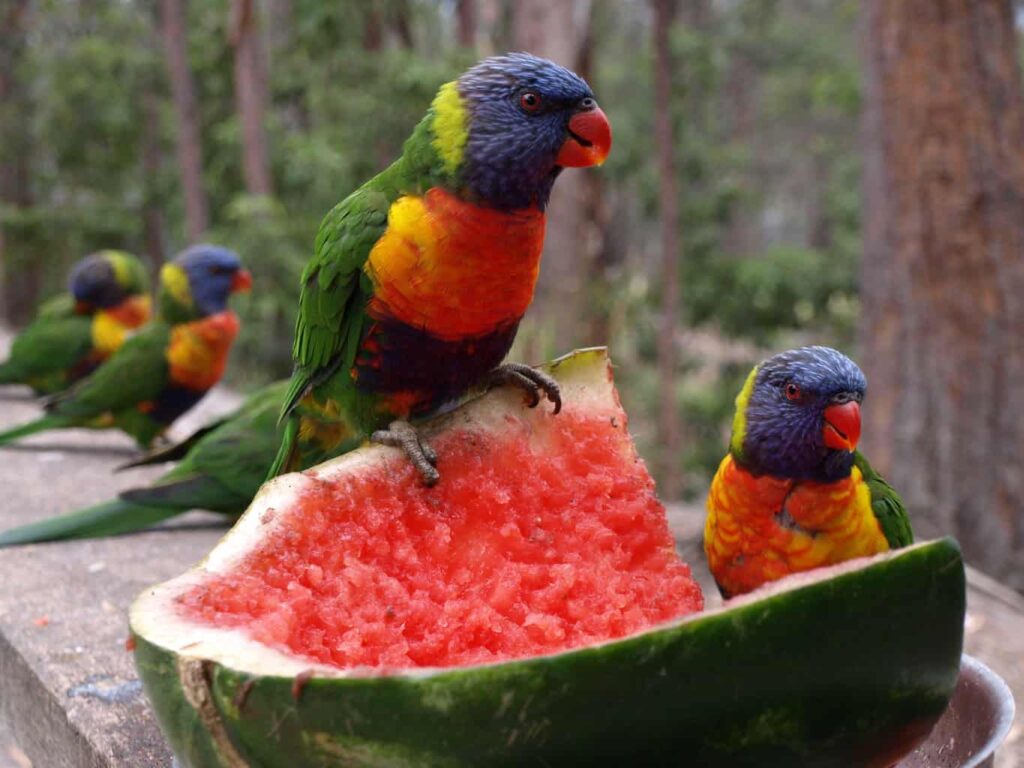Table of Contents
ToggleIntroduction
Parrots are native to tropical regions and get special attention for their colorful plumage and lively dispositions. Can Parrots Eat Watermelon? For centuries, people have been captivated by these amazing birds because of their extraordinary speech impersonation skills and their wide range of culinary preferences. To meet the dietary requirements of these feathered companions, aviculturists and pet owners are investigating the reasons behind the watermelon’s inclusion in a parrot’s diet.
Due to its juicy and hydrating qualities, watermelon is a favorite summertime treat for people. Its vivid pink and green tones conjure up ideas of leisure and sunshine. But there are more factors to consider than aesthetics when enjoying this delicious fruit with our parrot friends.
Potential Benefits For Parrots
Hydration: One of the most notable benefits of including watermelon in a parrot’s diet is its exceptional hydrating properties. With an impressive 90% water content, this juicy fruit serves as a natural source of hydration for parrots, especially during the warmer months. Because parrots are predisposed to tropical environments, creating an environment that promotes optimal hydration is critical. With its high water content, watermelon quenches a parrot’s thirst and contributes to overall well-being by supporting vital bodily functions. This hydrating component becomes especially important because proper hydration is essential for maintaining healthy plumage, promoting organ function, and ensuring overall vitality in our feathered friends.
Vitamins and Antioxidants: Aside from quenching thirst, watermelon is a nutritional powerhouse for parrots, providing many vitamins and antioxidants. Vitamin A, which is necessary for good vision, and vitamin C, which is necessary for immune system support, are both abundant in watermelon. It provides a natural boost to a parrot’s overall health. Furthermore, the presence of antioxidants such as lycopene aids in preventing oxidative stress and inflammation. These properties strengthen the immune system and help prevent various health problems. Watermelon’s vibrant spectrum of vitamins and antioxidants makes it an excellent addition to a well-rounded parrot diet, promoting physical vitality and longevity.
Low in Fat and Calories: Watermelon’s low-fat and low-calorie content appeals to parrot owners concerned about their feathered companions’ weight management. Because of its low-fat content, watermelon is a healthy snack for parrots. Furthermore, its relatively low-calorie profile makes it an ideal snack option for parrots concerned about their weight. Watermelon in a parrot’s diet provides a tasty treat without jeopardizing nutritional balance, making it a satisfying alternative to high-calorie snacks. Maintaining parrots’ optimal body condition and ensuring their long-term health and well-being is especially important.
Risks And Considerations
Sugar Content and Moderation: While watermelon has numerous advantages for parrots, It’s important to consider the high sugar concentration already present. Like many other animals, parrots can be sensitive to elevated sugar levels in their diet. Watermelon has sugar, mostly fructose. Fructose is considered safe. However, eating too much can cause weight gain. It can also lead to health problems like diabetes. Owners of parrots should proceed with caution while feeding their pets watermelon. Monitoring the amount and frequency of such watermelon treats helps strike a balance between the delicious sweetness & the potential risks associated with high sugar intake.
Seeds and Rind Precautions: While the fleshy part of the watermelon is generally safe for parrots, Avoiding the seeds & rind is essential. Watermelon seeds can be dangerous to parrots due to their hard outer coating, and they can be difficult to digest. Before giving your parrot watermelon, remove the seeds and ensure only the seedless flesh is available. On top of that, the rind is inedible since it is too tough and fibrous. Because it may be difficult for parrots to digest and cause gastrointestinal discomfort, parrot owners can reduce the risks associated with indigestible seeds and rinds by carefully preparing watermelon portions.
Potential Digestive Issues: Incorporating novel foods is essential to give the parrot’s digestive system a fighting chance. Gradually. Watermelon, while hydrating and nutritious, can cause digestive issues if consumed in large quantities or abruptly. When first exposed to watermelon, some parrots may experience loose stools or gastrointestinal discomfort. To prevent this from happening, feed your parrot a small quantity of watermelon at a time and see how it reacts.
Preparation And Serving
Seed Removal and Serving Size: To promote a risk-free and delightful eating experience. Watermelon for parrots requires careful consideration of seed removal and suitable serving sizes. Watermelon seeds, as previously indicated, can be a choking hazard and may be difficult for parrots to digest. Consequently, ensure all seeds have before offering this tasty treat to your avian friend. Something was dismantled with care from the watermelon slices or cubes. This extra precaution eliminates any potential hazards to your parrot’s health and makes watermelon feeding a breeze.
Monitoring for Any Adverse Responses: Careful monitoring for adverse reactions is required when introducing a new meal into your parrot’s diet. Closely observe your parrot for signs of discomfort, changes in droppings, or allergic responses as you present watermelon for the first time or gradually increase its frequency. While watermelon is generally well-liked by parrots, certain birds may have allergies to it. Urgent veterinary care is required in the event of any adverse effects, including gastrointestinal distress or changes in behavior.
Conclusion
It is clear that, when given in moderation, this delicious fruit. Can be a safe and pleasurable treat for our feathered companions. Watermelon is a refreshing food choice and an excellent source of vitamins, minerals, and antioxidants that are beneficial to the health of parrots.
Although parrots can safely eat the fleshy portion of watermelon, they should use caution when handling the rind and seeds. Eliminating the seeds and providing only seedless watermelon guarantees that parrots can enjoy this delicious fruit without consuming toxic materials. Small, manageable parts of the rind can also present themselves. But keeping an eye on the parrot’s reaction and digestion is important to prevent negative consequences.







